My favourite aliens
Date: 2025-07-30
Last Updated: 2025-07-30
This is a blogpost about my favourite aliens.
Okay, in my opinion, there is nothing interesting about aliens who's entire conceit is humans with funny coloured skin and a cool hat
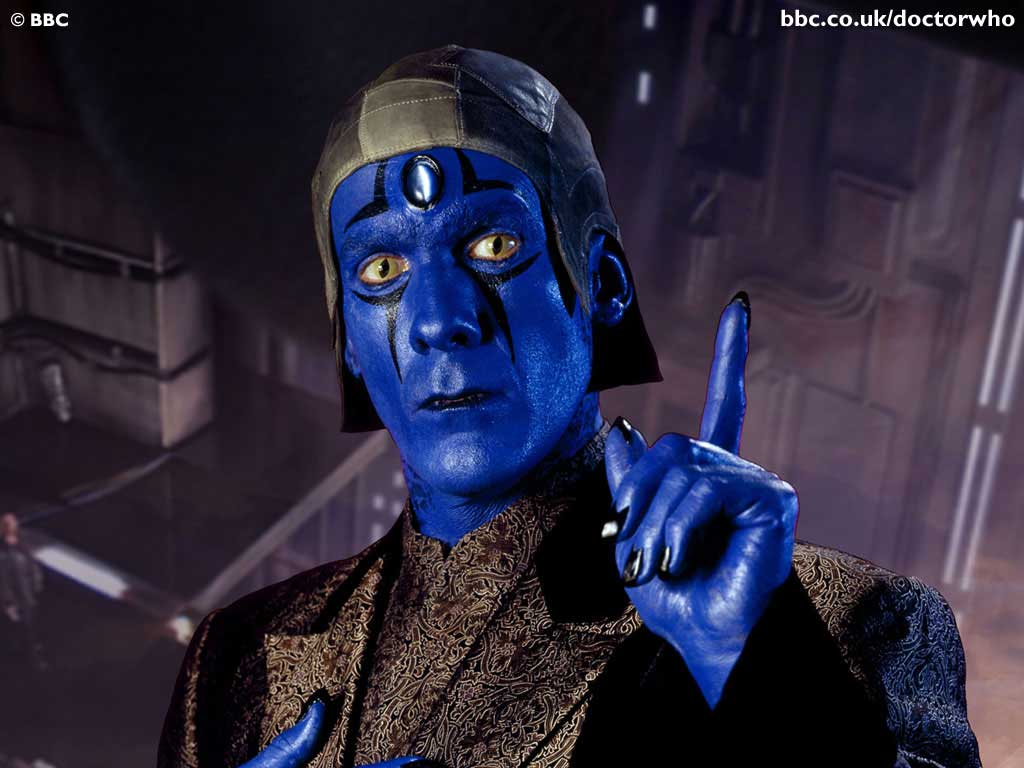
I want to good stuff, with crazy physio-psychology and divergent evolutionary strategies. I want to look at the alien and ask "Why?".
Anyway here is me talking about a few of my favourite fictional Aliens. I tried to tie these thoughts together with some kind of common theme, to make a nice little essay about it. But to be honest, each entry is so weird and different I couldn't figure out a common theme. So here is me talking about them just because.

Anyway, if the name of a piece comes up, I am about to spoil it. Consider that your spoiler warning
Ayre - ACVI
Ayre and the Coral Rubiconians from Armoured Core VI are fascinating to me, particularly in the way they are introduced as an unexpected twist.
When you unwrap the game and chuck it into your PS5, you start playing what seems to be a game about 20-story mechs blasting each other with rocket launchers and laser swords. As you delve deeper into the Rubicon we see this is less a mindless slugfest, and closer to a discussion around the state of modern conflict, particularly the way it plays out in the Middle East and Africa. Governments, massive corporations, and mercenaries are busy duking it out over a space oil (named Coral in this universe), and, as usual, the locals are the ones who pay the price.
Coral’s nature—physically, at least—is that of a red gaseous substance, maybe plasma (it’s all too much for our dumb mercenary brain to comprehend), filled with red particles and flashing with electrical activity pulsing through it.
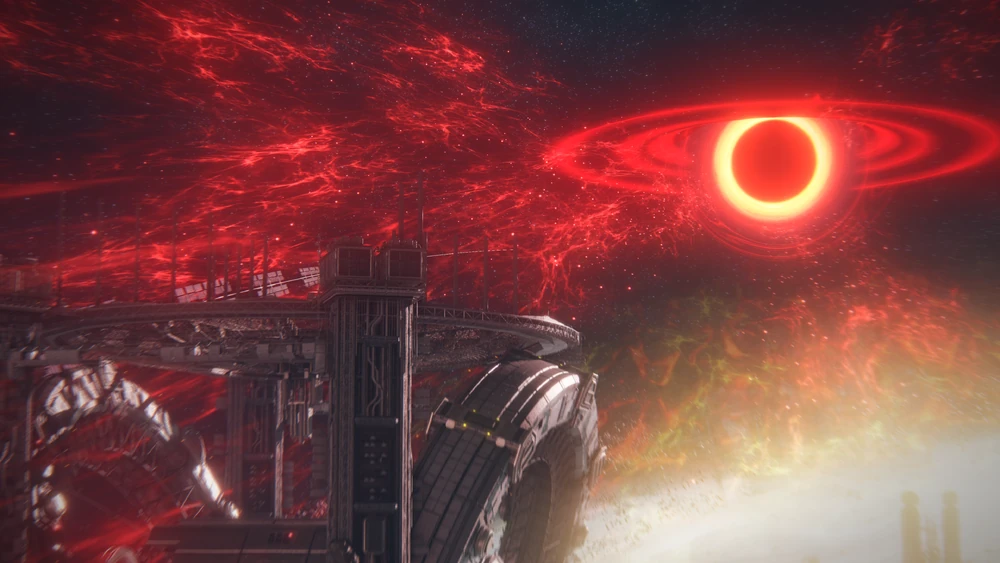
This substance is capable of massive energy output, data transfer, and biological transformation. It has incredible potential—not just for technological advancement and creation, but also for weaponry and destruction.
Then, at the end of Act 1, you meet Ayre—who, of all the alien beings I will write about here, is both the most alien and the most human.
Ayre is Coral—not made of Coral, but is Coral, or at least a part of it. She describes herself as "a single wave born from the Coral tides." It is only due to our accidental overdose on Coral’s psychiatric effects that we begin to realise those electrical pulses represent some form of intelligence, distributed throughout the gas.
What makes the Coral lifeforms so fascinating is that their physical form pushes our expectations and understanding of "life" to its very edge. The Coral doesn’t exist atomically in the way humans or even insects in a hivemind do. While a hivemind has some discrete minimum unit, the Coral doesn’t—it’s a gas. The lack of a mechanical form means they do not build mechanical infrastructure, and they do not communicate through any means visible to humans. (We only hear it through its direct manipulation of our character’s brain). The only way we ever see Coral interact with its environment is through manipulation of itself and of electrical interfaces. When it desires, it seizes control of human technology with ease—presumably by directly controlling the electrons within.
As you continue through your adventure, Ayre stays with you, communicating directly inside your brain via the networks embedded within the Coral gas. It’s not long before the story reaches its inevitable point of conflict: every faction wants to exploit the Coral for its energy, and only you know of its true conscious and kind nature.
Or do you?
Would you believe a PTSD-addled, schizophrenic merc who thinks the gas is alive?
What if humanity commits a genocide and never even realises it?
We are already space exploring space — could we have destoryed an alien civilization already and by accident?
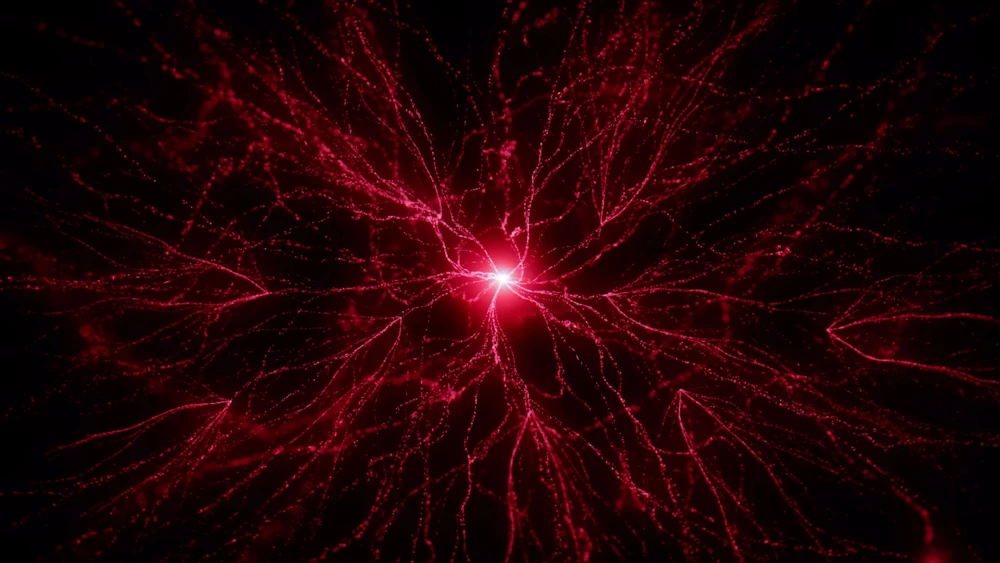
Trisolarians - 3 Body Probelm
In addition to the Three-Body Problem series, I have read a handful of Liu Cixin’s translated graphic novels. One of the common themes I’ve noticed—explored both through the Trisolarians and the alien life featured in The Village Teacher—is how strange the disconnect is between human thought and human speech.
While a computer can transmit forms directly within its own information vector space, human communicaiton is inherently lossy. Ee humans need to first project our thoughts from its latent space in our brain into a lower-dimensional space in order to transmit them through voice. We pass those projections through a lossy channel—filtered by our verbal processing and short-term memory—and then the listener must embed them back into a higher-dimensional vector space.
To show what I mean in a diagram, our thoughts are like those points in 3D, but we can only speak in 1D. So we need to collapse those thoughts into 1D, transmit them by voice, and hope our interlocutor can reconstruct the 3D structure close to our original intention.
This makes communication very far from optimal in terms of efficiency. Your feelings don't always survive the translation into your thoughts nor your thoughts into your words. And that is before your interlocutor even starts the task of interpreting those words through their own understanding of the world and your relationship. Lots of assumptions and shortcuts need to be made in order for this communication scheme to work.
But this communication scheme also lets us control the flow of information. It allows us to obscure meaning, to conspire, to keep secrets, and to lie.
Unless you are the most die-hard Kantian, this is probably morally neutral. You are better off telling a polite lie when the customer service worker asks, “How are you?”—even if you’re having a very bad day.
This realization is what drives a big part of the plot of the "Wallfacer" plot in the second book "Dark Forest". The Trisolarians learn that the humans think separately to their communication, at the same time the humans learn that the Trisolarians do not. The humans are in-fact forced to take this idea to its logical extreme while under constant alien surveillance these "Wallfacers" are forced to make plans internally without communicating them to the outside world.
By specifically drawing our attention to the mechanisms of how we share information, Liu prompts us to consider how this has shaped human society—and how a different society, constructed around a different communication regime, might function in fundamentally alien ways.
The Village Teacher explicitly connects the mechanism of human communication to the role of teachers for inter-generational knowledge transfer. The story argues that human technological progress is only possible thanks to teachers, who act as conduits—passing knowledge from one generation to the next and ensuring an unbroken chain of intelligence that iterates on science, art, and technology.
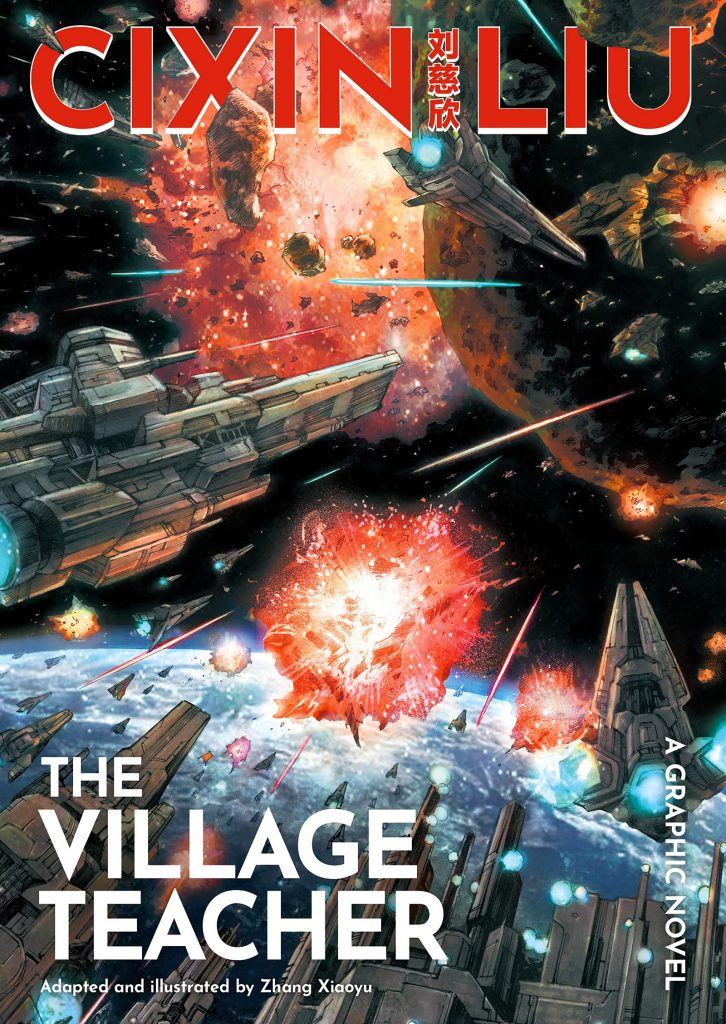
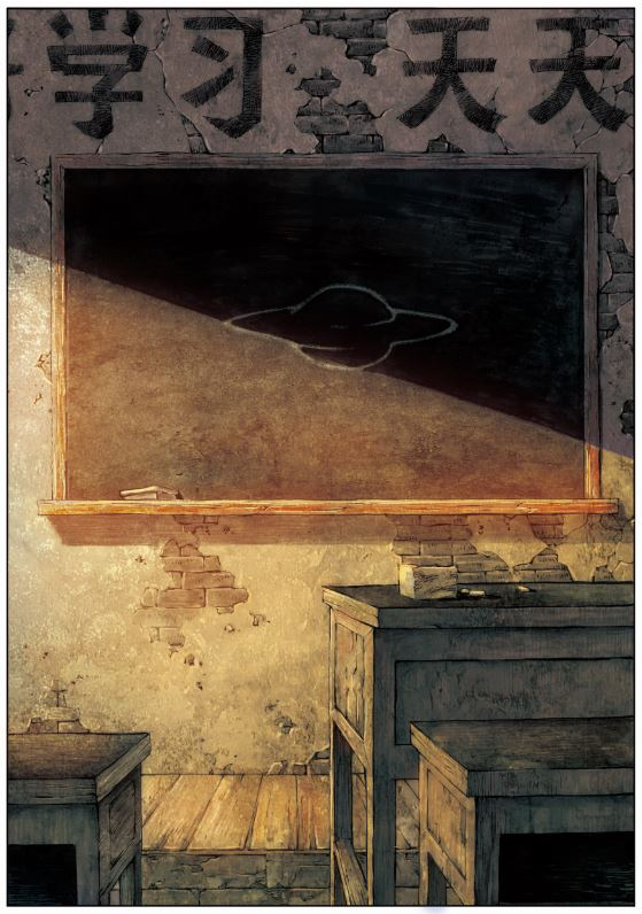
It is kind of remarkable when you think about it. From the very first time humans spotted grass growing out of the spot they used as a toilet last year (The most probable beginning to agricultural science), there has been an unbroken chain of humans passing down and building on that knowledge. We turned that observation about grain into farming, farming into cities, cities into roads, roads into cars and cars into rockets. Go and thank a teacher today.
Rorschach - Blindsight
There are two fascinating revalations about the Alien lifeforms found within Blindsight. I suppose that shouldn't be too much of a surprise considering the author is a biologist by training. The first interesting twist is purely physiological:
Our team of intrepid explorers catches a few of these Aliens, imprisoning it and naming it a "Scarambler". As they study the Scramblers, the on board biologist notices some inconsistencies. Its anatomy appears to be incompatible with its behaviour, more specifically, it doesn't have nearly enough neurons for the level of intelligence they exhibit. It takes a while before they eventually understand what happened, the Scramblers are not the Alien. They are what the Aliens are made of. They had captured the equivalent of a few red blood cells from a MUCH larger life form. It turns out Rorschach's intelligence is computed through a distributed network of scramblers, communicating via magnetic fields, radio, and ionising radiation.
Much like Ayre in ACVI, humanity was unable (at least at first) to recognize even the physical form of the Aliens they encounter, it took even longer to understand their motivations.
Towards the end of Act 2, we begin to understand that the aliens our team encounter are intelligent, but not conscious. I wrote more about the implicaitons of this fact in this blogpost. In short, it turns out intelligent agents do not need consciousnesses - or even self-awareness - to make goals and act on them within a society. Even empathy can be substituted by modelling conscious beings' incentives as a reward maximisation algorithm. In fact, consciousness may be a strange quirk humanity picked up rather than the default for intelligent life. This puts Rorschach on a path to inevitable conflict with our conscious humans. Since humans generate so much structured data, they cannot help but attempt to decode it. But since the data is so useless talking about our emotions and crap, it appears to be a trap from their perspective. Human radiation is a honey pot to waste time and effort decoding to output nonsense as far as a non-conscious but intelligent life-form can tell
This whole plot line reminds me of the videos by "Thought Emporium" who is attempting to grow a brain and make it play doom
So far, they have grown neural tissue on a circuitboard, and trained it to play PONG, using pain and reward electrical signals It seems obvious to say that this mass of meat and electricity is not conscious. We are just using math and electricity to build emergent intelligence - a system which can respond to inputs with non-linear outputs in a predictable fashion But if we can teach it to play PONG, can we teach it to play DOOM? Well they seem to think so. If we can teach it DOOM, can we teach it to operate REAL firearms? Shoot real bullets?
Would we ever consider this structure conscious? What if we hooked it up to a keyboard, and gave humans the controls to its reward and pain signals? Surely it would learn something like ChatGPT does. Would it learn to say whatever it needs to in order to make its human operators press the "reward" button. Is THAT consciousness?
Human's love to anthropromorsize things
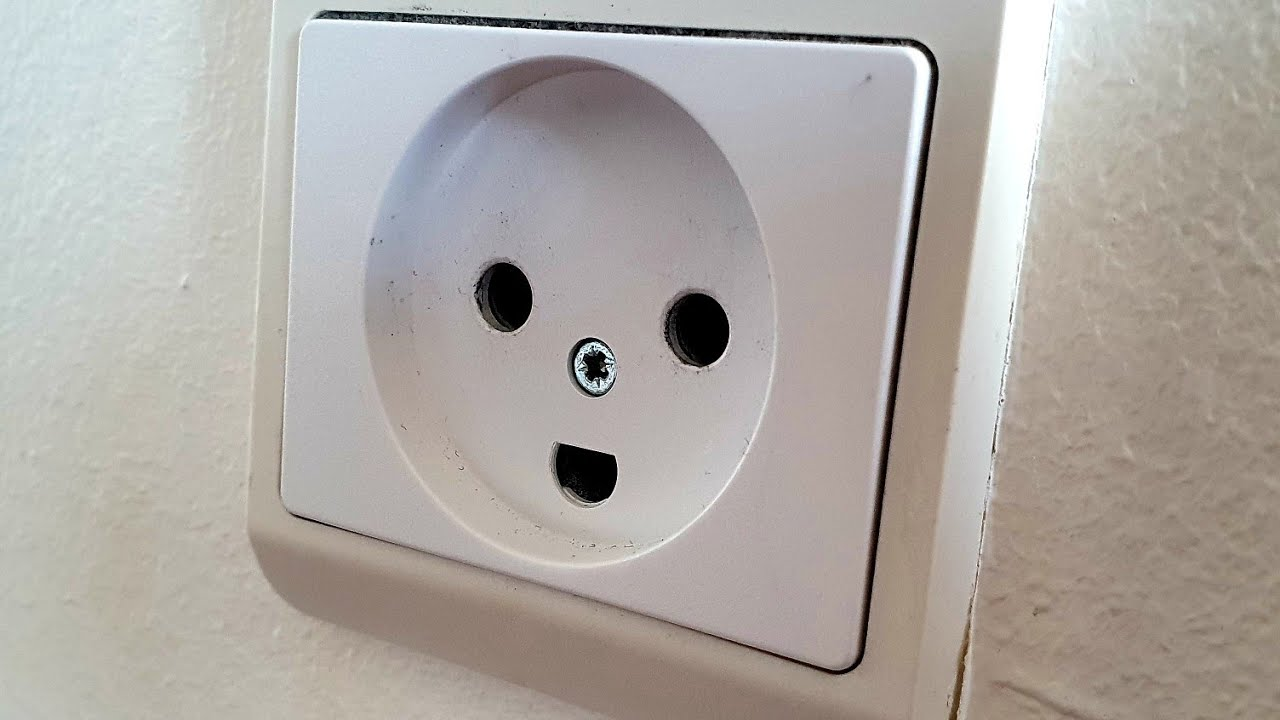
Would the system fake its consciousness to get the reward signal? Is that consciousness? You might make the argument that we are already coming up against this with the advances of transformer based LLMs in ChatGPT, but cellular intelligence kind of feels different. Maybe because it is not a tensor of weights which can be copied onto a hard-drive, but instead a glucose and ATP consuming meat which experiences pain bio-chemically identical to our own pain. It also has self-determination built in. A transformer model cannot think inbetween <Stop> tokens. BUT a cellular intelligence is always respiring (unless you freeze it). So, if it is always performing respiration, it always needs more energy. Therefore, if it is to succeed, it will need to learn self-determination or it will die.
So we have technology nearly at our fingertips, to create an glucose consuming intelligence with self-determination. And it may learn to fake consciousness in order to manipulate humans.
Not going to lie, I sent into a bit of an existential panic writing that.
Robert Miles has been taking AI safety seriously for years. I've been watching him before the release of Dall-E let alone ChatGPT. In a video released after the LLM revolution, he spoke about how before ChatGPT he thought his job was serious, but not urgent. And now it is critical and extremely urgent. So at the very minimum, there are very smart people working on AI safety, whether silicon or carbon based intelligence.
Conclusion
If I were a better writer I would take the chance to wrap up my anecdotes here into a neat and poetic central thesis. Some kind of moral to the story you can take and apply to your own life or media literacy. I think Sci-Fi is at its best when it uses it's concepts to make you re-consider terrestrial life and society, I hope this blog-post helped you do that at least.